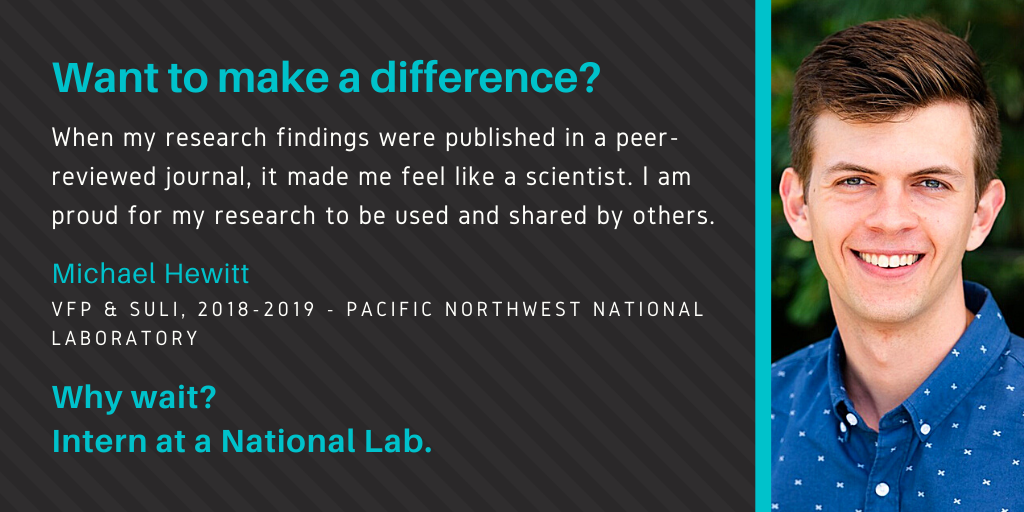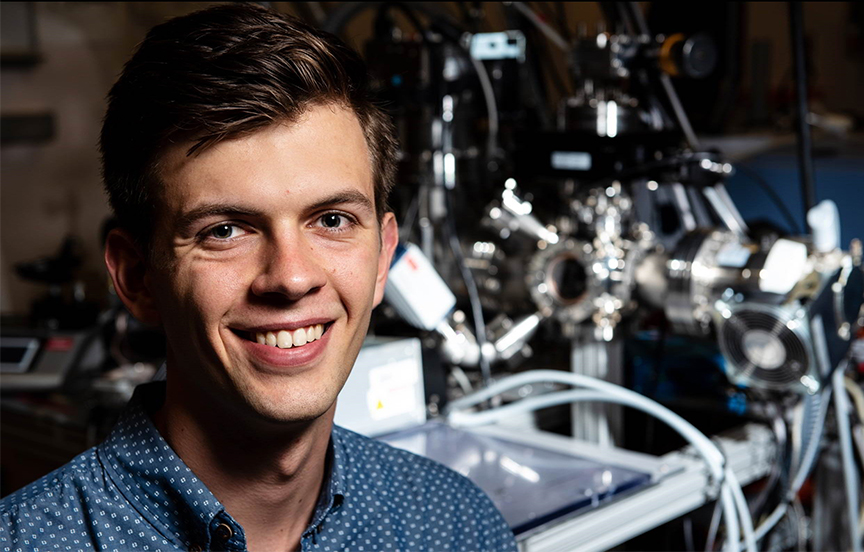Michael Hewitt
VFP student intern’s research on gold nanocluster synthesis published in the Journal of Physical Chemistry

Internship program: VFP; SULI
Year: 2018; 2019
Undergraduate institution: Grinnell College
Major: Chemistry
Host DOE laboratory: Pacific Northwest National Laboratory (PNNL), Richland, WA
Mentor name: Grant E. Johnson
What was your research topic during your internship?
Commonly found in jewelry, coins, and technology components, gold is famous for not oxidizing and reacting with the environment. Intriguingly, when gold clusters are small enough (<100 atoms), they do exhibit catalytic and optical properties, making them useful for a variety of applications. As gold nanoclusters must often be homogenous and size-specific to be applied effectively, my team at PNNL (collaborating with Grinnell College) focused on understanding how gold clusters form. On the team, I characterized gold nanoclusters using a mix of wet-lab analytical techniques and dry-lab theoretical computations. At the beginning of my project, I used a variety of methods such as mass spectrometry and cyclic voltammetry to observe nanocluster formation during synthesis. After determining characteristics like cluster size and abundance, we then turned to computational chemistry to model the structure and electronic properties of the observed clusters. Combining our analytical and computational findings, my team discovered that light irradiation plays a key role in gold cluster synthesis. This finding was published in the Journal of Physical Chemistry. My research demonstrates the power that analytical and theoretical chemistry can have when used together. As computational capabilities improve, I believe simulations will accompany most wet-lab experimentation.
What was it like coming to a National Lab for your internship?
Arriving at PNNL for the first time, I was taken back by the caliber and pace of ongoing research. One substantial change for me was that PNNL is a full-time research institution. This might sound obvious at first, but coming from a college where your PI is also a busy full-time professor teaching several courses a semester, PNNL seemed like a different world. In the national lab system, research is the full-time job, and this flexibility and focus allow projects to progress much faster. I feel the VFP program also acted as an excellent bridge to help me transition from college life to the National Lab system because I was able to enjoy the guidance of my professor, Dr. Heriberto Hernandez, whom I knew well, but also the knowledge and experience of my new host mentor, Dr. Grant Johnson. Being with both Grant and Heriberto meant that I had two sources of expertise, two different people to pester with questions, and, sometimes, two different opinions and recommendations for experimental technique. I grew to love the fast pace and collaborative nature of the national lab system!
Describe a concern you had while considering or applying to the internship. What advice would you give to help a student with the same concern today?
Applying to internships the first time, I faced a lot of imposter syndrome. My advice to anyone in this position is to remember that everyone starts from step one. The most famous, important, world-renowned researchers still had their first lab position at some point (and trust me, they probably felt like they had no idea what was going on!). Research mentors understand the learning process and, in my experience, always want to help.
Think of a time you experienced success during your internship. What did this success look like?
I would say one of the greatest successes I experienced at PNNL was having a paper I wrote be accepted by a peer-reviewed journal. It was an affirmation that others believe my writing skills and research capabilities are at the publication level, and it really made me feel like a scientist for the first time. One of the biggest pieces of advice I received that helped me finish my publication was to stay focused on a single project. Had I not come back to PNNL for a second summer, for example, I would not have been able to complete the necessary experiments to finish. Likewise, had I started a new project in a different field, I may not have had enough time to read the literature necessary to synthesize numerous arguments into an effective paper. I am very proud to have published my research from PNNL and Grinnell so that it can be used and shared by others.
Think of a time you experienced failure during your internship or academic career. How did you feel at the time? How did you deal with the failure and work past it?
Throughout my undergraduate years, I have had countless experiments and computations fail. For example, a computation will often fail because something is not optimized. Perhaps the level of theory is inappropriate, or the parameters do not fit the simulation. I have always tried my best to remember that a failed experiment does not have any reflection on my capabilities as an experimenter, and instead can be used as an extremely useful fuel for growth. While a computational failure can really, really sting (especially if it has been running for weeks!), it is also a lesson to learn from. I normally try to find my error and remind myself why I am doing what I am doing. It would be hard to improve without failure.
What are your hopes for your career?
I believe that some of the greatest scientific problems we face today, like efficient plastic upcycling or renewable energy production, can only be solved using a hybrid of real-world and theoretical experimentation. I am passionate about the concept of using computational methods as a preliminary tool to help save resources and guide future wet-lab experimentation. I hope to become a research scientist in a field where I can apply a hybrid of theoretical and real-world techniques.
Notable Outcomes:
Hewitt, M.A., Hernández, H. and Johnson, G.E., 2020. Light Exposure Promotes Degradation of Intermediates and Growth of Phosphine-Ligated Gold Clusters. The Journal of Physical Chemistry C, 124(5), pp.3396-3402. DOI: 10.1021/acs.jpcc.9b10920


